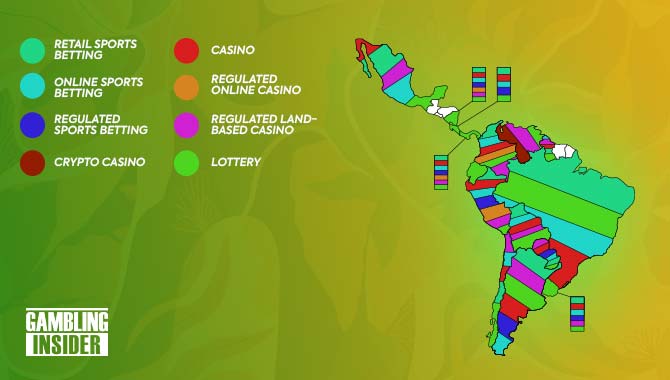The state of Latin America: Where are the key regulated markets?
As each country has opened up to legalising gambling and the millions that it brings in terms of tax revenue, operators, affiliates and suppliers from around the world have clamoured to get a piece of the market.
Currently, the continent is made up of a complete mixture of regulations, some parts are wholly restrictive, others are permissive to a near-oblivious level and the rest are working to regulate as fast as possible – if they haven’t already.
Here, Gambling Insider explores the regulations found in each country and what is and isn’t currently legal.

Argentina
Gambling Legal: Yes
Argentina, much like the US, regulates all of its gambling on a state-by-state basis – leaving it to the individual jurisdictions to decide what kind of rules to set when it comes to gambling restrictions.
Brazil
Gambling Legal: Yes
While gambling is legal in Brazil, the market is near-universally unregulated. However, attempts to regulate gambling are now being pushed forward and are expected to pass in the near future.
Bolivia
Gambling Legal: Yes
Although online gambling is technically illegal, the state doesn’t prosecute those that do it – while land-based betting is entirely legal.
Chile
Gambling Legal: Yes/No
While gambling in Chile is legal, online casinos remain illegal – though players are not prosecuted for doing so – but, there are several rule changes that could be coming soon that will legalise all forms of gambling in the country and regulate it simultaneously.
Colombia
Gambling Legal: Yes
Colombia has legal betting, so long as the companies that enter Colombia’s betting market have a local licence.
Costa Rica
Gambling Legal: Undefined
The Costa Rican Government have an ‘unspoken approval’ of gambling in the country, though the practice is not strictly approved – since it is included under the country’s gaming law.
Ecuador
Gambling Legal: No
Ecuador completely closed off all gambling in 2011, and the industry has remained banned ever since the Executive Decree was ordered. However, foreign websites are allowed.
Guyana
Gambling Legal: Yes
While gambling is legal in Guyana, much of the country’s online gambling remains unregulated.
Mexico
Gambling Legal: Yes
Nicaragua
Gambling Legal: Yes
Panama
Gambling Legal: Yes
Paraguay
Gambling Legal: Yes
Peru
Gambling Legal: Yes
Uruguay
Gambling Legal: Yes
Venezuela
Gambling Legal: Yes – the two casinos accept cryptocurrency as payment.
Right now, the only legal gambling found in Venezuela is in casinos that also accept cryptocurrency.
| Country | Retail Sports Betting | Online Sports Betting | Regulated Sports Betting | Casino | Regulated Online Casino | Regulated Land-Based Casino | Lottery |
|---|---|---|---|---|---|---|---|
| Argentina | |||||||
| Brazil | |||||||
| Bolivia | |||||||
| Chile | |||||||
| Colombia | |||||||
| Costa Rica | |||||||
| Ecuador | |||||||
| Guyana | |||||||
| Mexico | |||||||
| Nicaragua | |||||||
| Panama | |||||||
| Paraguay | |||||||
| Peru | |||||||
| Uruguay | |||||||
| Venezuela |
FAQ’S
How can you tell licensed operators from unlicensed ones?
The answer here is you have to do research into the operator. Of course, it is an added chore to do when a player wants to get down and play, but being in the regulated market is always safer than not. Many countries in LatAm won’t prosecute players for gambling with black market operators, meaning that those operators exist freely – and usually without adequate player protection in place. Therefore, the word here is ‘caution.’
Is regulated sports betting coming in Brazil?
Well, the answer to that is, yes. Brazil’s President Luiz Inácio Lula da Silva signed the bill that has regulated the practice as of 12 May 2023. As of now, Brazil is in the process of adopting it into daily life, ending a significant wait for many operators, suppliers and players in the famously football-obsessed country.
gamblinginsider
Comments are closed.




